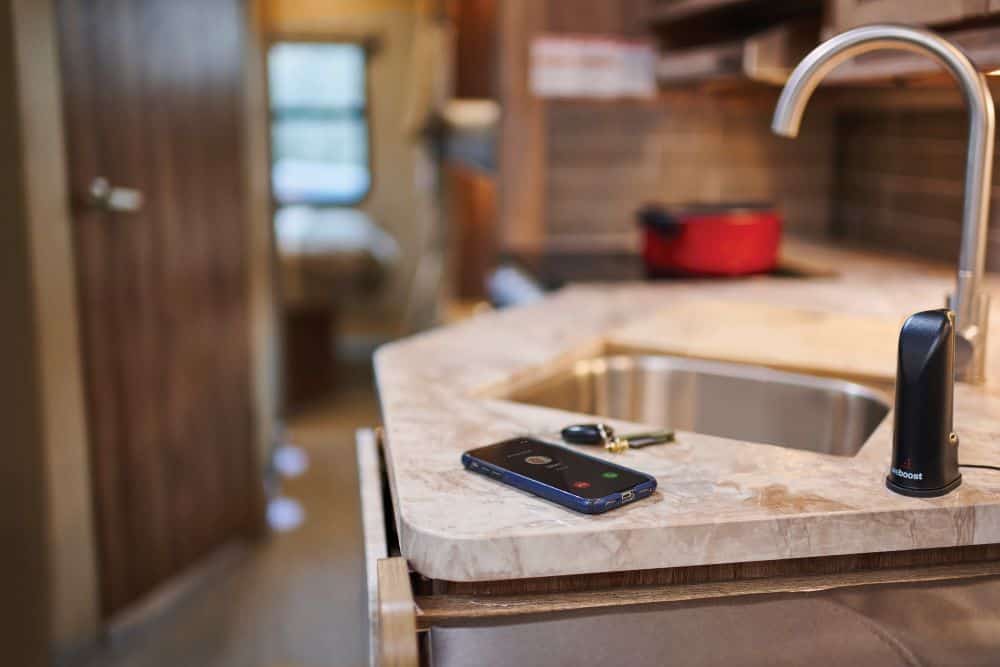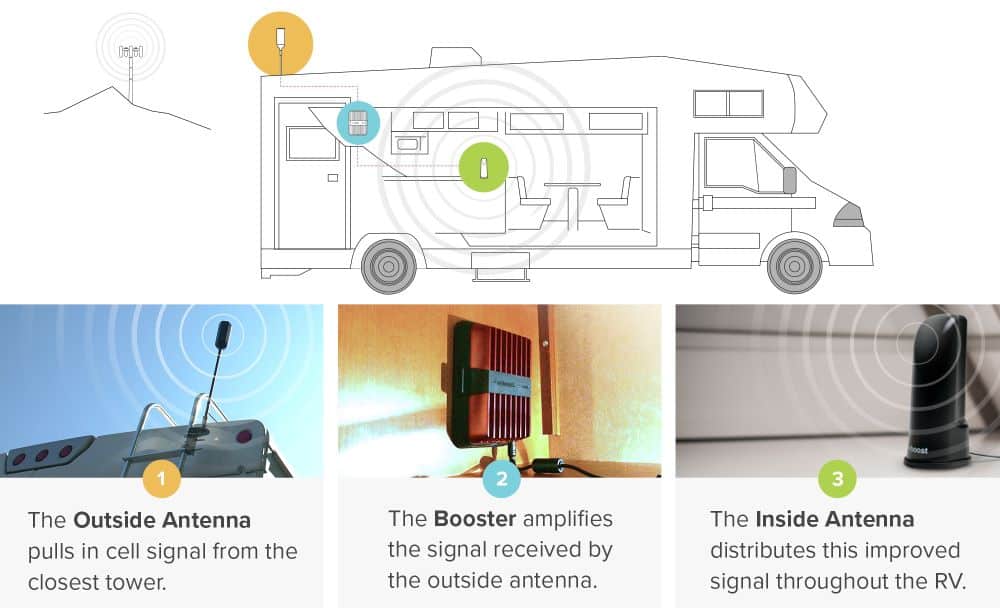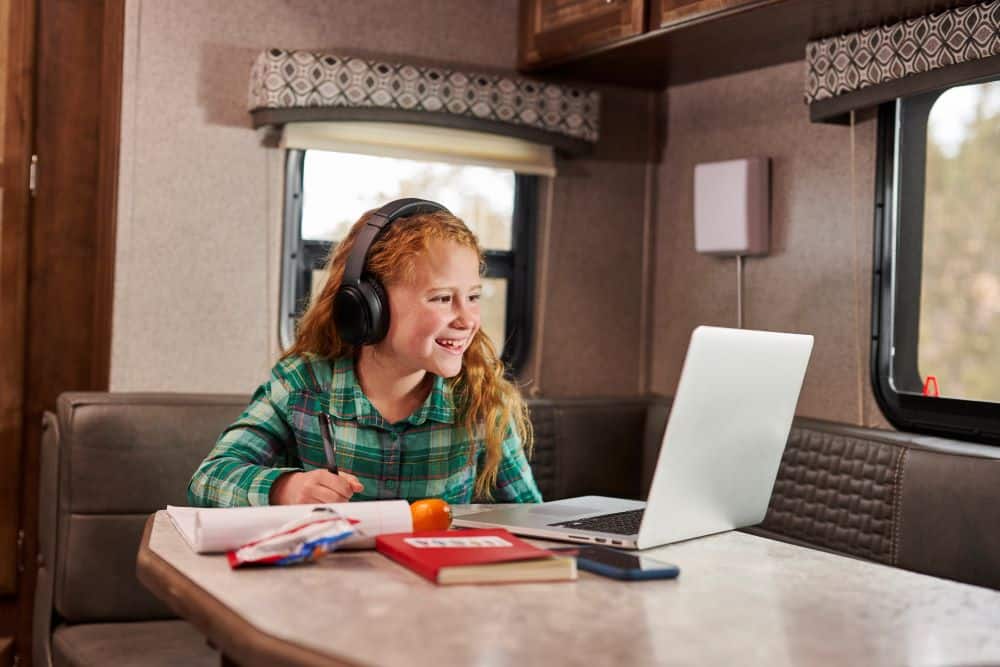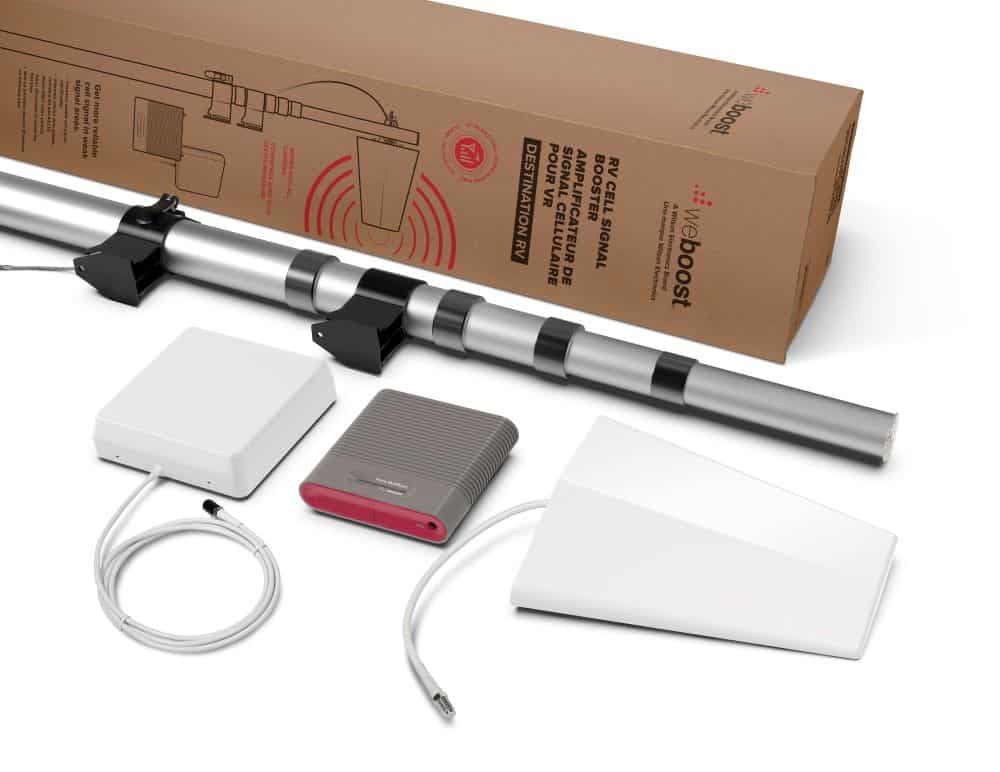Blog
How to Get Better Cell Signal in an RV
October 13, 2022 — by WEB ADMIN
SHARE ARTICLE[Sassy_Social_Share total_shares="ON"]
Whether you’re taking a cross-country road trip or going camping an hour from home, you’ve likely faced your fair share of cellular connectivity problems in your trailer or motorhome. A strong signal is especially important when you’re on the road. In this article, you’ll learn how to get better cell signal in an RV.
The first thing to understand is that poor signal in your RV is typically caused by the same two variables that cause poor signal elsewhere:
- You’re too far from a cell tower and your phone doesn’t have a strong connection.
- You’re in range of a cell tower, but obstructions are weakening your signal.
For people who like to explore the outdoors, the first problem is bound to happen often. Even the very best cellular provider doesn’t have towers in every corner of the country.
The second problem, however, could be caused by the very thing that lets you travel in comfort and style. The aluminum shielding on your RV is fantastic at protecting you from harsh elements. Unfortunately, it’s equally good at “protecting” you from cellular signals. Thankfully, there’s a way to alleviate both of these problems.
How to get better cell signal in an RV
There are plenty of free ways to get better cell signal in an RV when you’re on the road. If you’re a seasoned traveler, you’ve probably already done things like finding higher ground to make a call, or stopping on the side of the road when you lock on to a strong signal.
But when you’re enjoying the great outdoors, the last thing you want to do is grapple with a cellular signal. For this reason, the single best thing you can do to get better cell signal in your RV is to install a cellular booster.
Boosters designed for RVs are versatile. They can be installed on the roof of a Class A motorhome or mounted on top of a popup camper — and everything in between. They’re designed to alleviate connectivity problems by boosting cell signal inside your RV by a factor of 32x. That means no more stopping on the side of the road or driving toward the highest peak to find a decent signal, because you’ve got the equipment to seamlessly get better cell signal in an RV.
A closer look at RV cell signal boosters
Generally speaking, cell phone boosters are designed to detect and latch on to weak signals and then amplify and redistribute them to a specific area. Models made for RVs differ slightly from those made for residential locations, but the premise is the same. They work by combining three main components:
- An outside antenna to capture even weak cell signal
- A booster to amplify or “boost” that signal
- An inside antenna to broadcast the stronger signal in the RV
These three components are connected via a coax cable that runs from the outside antenna to the amplifier and then to the inside antenna. The outside antenna captures overhead cell signal, pushes it through the amplifier, and re-broadcasts it inside your RV. It also does the same in reverse. The inside antenna captures your phone’s signal, amplifies it and beams it back to the cell towers.
In other words, a cell phone booster for your RV can help you get better cell signal in an RV, and is likely to work in most places. But boosters aren’t without limitations.
RV cell signal booster limitations
It’s important to understand that boosters can’t generate a cell signal out of thin air. They work by capturing and amplifying existing cell signals. Even if the signal is weak, a booster can help amplify it enough to provide good connectivity to your RV. But if there’s no signal at all, there isn’t anything for the booster to capture and amplify.
This can be a source of frustration to some travelers, especially those who like to wander off the beaten path. But it’s important to keep in mind that how well a booster works is correlated to how much signal it can capture overhead.
Likewise, if the signal outside is very weak, the booster may provide enough amplification to let you make a call, but you might have to sit closer to your inside antenna.
That said, boosters can provide enough amplification to alleviate many of the problems travelers experience. For example, in an area where the signal is spotty but not at zero, a booster can help you get better cell signal in an RV and prevent you from running in circles to use your phone.
Picking the right RV cell signal booster
There are a couple of different RV signal boosters to choose from. The one you should choose depends on how you’ll be using it. For example, you may be looking to enhance the signal in your camper while you’re at your favorite campground. On the other hand, you might want to improve signal when you’re on the open road in your motorhome. For a comprehensive comparison between our two most popular RV signal boosters, read this article that compares Destination RV to Drive Reach RV.
Directional antenna boosters
For those looking for a stronger signal in a stationary location, a booster with a directional antenna, like Destination RV, is the best choice. Directional antennas are designed and configured to point directly at the nearest cell tower. Because of this, they offer superior range and throughput. In many cases, they can turn an extremely weak signal into a perfectly usable one.
The downside to using this kind of antenna is that every time you change locations, you’ll need to re-orient your antenna to point it toward the nearest cell tower. This setup process should take about 10 minutes. It also doesn’t work to boost signals in a moving vehicle because the antenna has been taken down. In other words, this setup is better for those who frequent one or two spots where they’re going to be hanging out for a few days.
Omnidirectional antenna boosters
On the other hand, if you’re more of a road traveler, you may want to consider an omnidirectional antenna like the one that comes with Drive Reach RV. This kind of antenna doesn’t need to be pointed toward a specific cell tower. Instead, it captures signals from every direction. And while they don’t have the same range as a directional antenna, they’re much more versatile. You can even use them whether you’re stationary or driving down the road.
Other considerations
When looking at boosters to get better cell signal in an RV, you’ll want to take into account specific features the booster offers. For example, some boosters only work with certain carriers. While you may not be planning on switching carriers, a better investment would be to choose a booster that works with any North American carrier. The ability to work with any carrier is a basic feature of all weBoost boosters. We often refer to our products as being carrier agnostic, meaning it doesn’t matter which carrier or carriers you and your crew are using. weBoost will support all of them at the same time.
This is beneficial for those who often have family or friends who tag along on their camping trips — after all, they may not use the same carrier as you.
Other features to look for in a quality booster are things like self-monitoring and gain control. Cheaper boosters simply work in an on-or-off state. A weBoost booster with self-monitoring and automatic gain adjustments can continually adjust its signal capturing and amplification to provide the best possible signal.
Tips for installing an RV cell signal booster
Installing a booster can seem a little daunting at first, but it’s really not difficult. If you can manage the other equipment in your RV, you can probably install your own booster. And once it’s completed, you’ll get better cell signal in your RV for every trip. Here are a few tips to help you get everything set up and working seamlessly.
Mounting your antenna
Your outside antenna needs to be mounted vertically, not horizontally or at an angle. It’s often best to mount it on your RV’s ladder or a top vent. Just make sure it’s above the roofline and any nearby obstructions such as your AC unit.
The higher you mount your outside antenna, the better your signal will be inside your RV. But keep in mind height restrictions for vehicles in your state. Every state has its own limits but most fall within 13 and 14 feet.
Lastly, it’s a good idea to mount the antenna on the driver’s side. This makes it less likely for overhanging branches and other obstacles to hit or snag the antenna when you’re driving down the road.
If you opt for Destination RV with the directional antenna, it comes with a 24-foot telescoping pole that holds the antenna. You will not mount your antenna permanently to your RV, but you’ll mount it to the pole instead. The pole can be attached to the side of your RV when you reach camp to keep it steady.
Amplifier placement
When you’re placing your amplifier, it’s extremely important that you have enough distance between it and both antennas. This helps ensure the booster system can operate at maximum efficiency. If the amplifier is too close to one of the antennas, it causes oscillation — or a feedback loop. This causes the booster to reduce signal amplification or even shut down completely.
Keep in mind, your amplifier also needs access to a 110v or 12v power source. It also needs to be in a spot with adequate ventilation, so be wary of mounting it inside of a pantry, a closet or another enclosed space.
Soft installation
The best way to figure out how and where to mount your booster is to run through a “soft installation” before mounting anything. Connect all of your booster components and plug everything in. Then, run the outside antenna through an open window or door and make sure everything connects and works properly before mounting anything permanently.
Get better cell signal in an RV with weBoost
At weBoost, we provide a variety of mobile cell signal boosters for your car, truck or RV. But don’t just take our word for it — we’re the official partner of Subaru Motorsports USA.
If you’re looking for a high-quality cell signal booster to improve your cellular connectivity on the road or in your favorite camping spot, look no further. Start shopping today.
buttonbutton SHARE ARTICLE[Sassy_Social_Share total_shares="ON"]TAGS: RV





